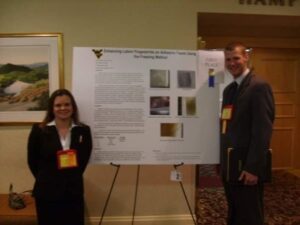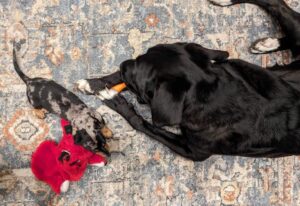 Imagine a world where a former forensic scientist analyzes the ingredients of a perfect picture book – with a side of horror movies and ambitious baking goals. That’s the reality of Dan Cramer, founder of Page Turner Literary Agency.
Imagine a world where a former forensic scientist analyzes the ingredients of a perfect picture book – with a side of horror movies and ambitious baking goals. That’s the reality of Dan Cramer, founder of Page Turner Literary Agency.
This quirky agent is driven by a deep love for reading and believes children’s books have the power to be surprisingly bold. Let’s explore his unique perspective and discover what makes this book lover’s heart sing. Along the way, we’ll learn a bit about his agency and clients, too!
RVC: Let’s begin with an easy but important question. Do you go by Dan or Daniel?
DC: I accept all forms of my name. Dan, Daniel, Danny, Daniel Boone, Booner, and Uncle Boone. I usually just introduce myself as Dan because it’s short and easy to say. I had a speech impediment when I was younger.
 RVC: Okay, Dan. Let’s dive into the real question on everyone’s minds. Henry…great rescue dog, or the GREATEST rescue dog?
RVC: Okay, Dan. Let’s dive into the real question on everyone’s minds. Henry…great rescue dog, or the GREATEST rescue dog?
DC: Henry is obviously the GREATEST rescue dog. He’s a Great Dane/Lab mix. He’s wonderfully lovable and currently a great big brother to his new sister, Longaniza (Lawn-gah-knee-sah) or just Niza (Knee-sah) for short. She’s a mini dachshund and her name is a Filipino breakfast sausage. My husband is Filipino and a cozy murder mystery series I enjoy by Mia P. Manansala has a dachshund by the same name in the books.
RVC: Makes perfect sense to me! Now, what’s the best lesson Henry has taught you that serves you well in your role as a literary agent?
DC: He’s always excited to go on an adventure. As a literary agent, I have to be excited to go on adventures, too. I have to dive into the worlds created by authors and illustrators and imagine a place for their stories in this big crazy literary world. If I’m not being adventurous, I’m probably not doing my job right.
RVC: Let’s hit the other Big Question here. How often are you mistaken for this Daniel Cramer (who is a film agent for William Morris)?
DC: That hasn’t happened yet – that I know of. But does make me want to read a murder mystery of literary agent mistaken identity! Two agents. Same name. One dead body. Will Daniel Cramer land the deal or end up six feet under? Cue dramatic music.
RVC: I’m in! But while we’re waiting for that book/movie to happen, let’s circle back to the questions I meant to ask already, like this—what was your first important book experience as a kid?
 DC: I was a very reluctant reader as a kid. The first book I remember reading on my own was Squanto, Friend of the Pilgrims and Shiloh after that. While I enjoyed both books, I wasn’t all excited to read more books. I read a few Box Car Children books and Amelia Bedelia. Again, I enjoyed reading them, but my love of reading still wasn’t there. It wasn’t until fifth grade when I read the Chronicles of Narnia (out of order) that I really fell in love with reading. Since then, I’ve just been turning pages.
DC: I was a very reluctant reader as a kid. The first book I remember reading on my own was Squanto, Friend of the Pilgrims and Shiloh after that. While I enjoyed both books, I wasn’t all excited to read more books. I read a few Box Car Children books and Amelia Bedelia. Again, I enjoyed reading them, but my love of reading still wasn’t there. It wasn’t until fifth grade when I read the Chronicles of Narnia (out of order) that I really fell in love with reading. Since then, I’ve just been turning pages.
RVC: Where/how did you get the bug to be an FBI person?
 DC: My undergraduate degrees are in Forensic and Investigative Sciences and Psychology. I went to West Virginia University and the Forensic program was connected with the FBI Lab. During my senior year, we had to do our own research and present our findings at a CBD-IAI conference. My best friend and I (still best friends) worked together. Our research was on developing latent fingerprints on the adhesive side of tape. A recruiter from the FBI approached us after our presentation and took our contact information. Unfortunately, that was also at the same time the government had a shut down and they weren’t hiring. So, I did a year of grad school in pathology and my friend worked for a local police department as an evidence technician. About a year after our presentation, I got the call from the FBI recruiter asking if I was interested in working at the lab and if I had my best friend’s contact information. I said yes to both.
DC: My undergraduate degrees are in Forensic and Investigative Sciences and Psychology. I went to West Virginia University and the Forensic program was connected with the FBI Lab. During my senior year, we had to do our own research and present our findings at a CBD-IAI conference. My best friend and I (still best friends) worked together. Our research was on developing latent fingerprints on the adhesive side of tape. A recruiter from the FBI approached us after our presentation and took our contact information. Unfortunately, that was also at the same time the government had a shut down and they weren’t hiring. So, I did a year of grad school in pathology and my friend worked for a local police department as an evidence technician. About a year after our presentation, I got the call from the FBI recruiter asking if I was interested in working at the lab and if I had my best friend’s contact information. I said yes to both.
RVC: What was the most difficult aspect of that work?
DC: There was a rigorous 18-month training program that I went through learning all about the science of friction ridge skin, processing evidence, learning to testify as an expert witness, and comparing unknown prints to known prints. The most difficult aspect was the comparison of unknown prints to known prints. TV makes it look easy, but it’s a very difficult process. The unknown prints are rarely pristine. There is always some type of distortion (smeared, smudged, wiped, etc.) and most unknown prints are just a partial print – sometimes just a few ridges. My mentor realized, and if I’m honest with myself, I realized too that I wasn’t great at comparison. So, I did a lateral transfer within the laboratory to the Evidence Control Unit, where I was the first person to see the evidence arriving at the lab, would inventory the evidence, and help determine its life cycle within the laboratory (which forensic testing would be conducted on each item of evidence.)
RVC: In what way(s) did it prepare you for your career as a literary agent?
DC: I’m very organized and can handle large volumes of information without being overwhelmed. Some cases would have thousands of items of evidence and I would have to keep track of all of it.
RVC: How did the shift—from FBI person to agent—happen?
DC: I met my husband while I was working for the FBI. We both lived in DC and met the old-fashioned way – in a bar. I didn’t even have a smart phone at the time. We both agreed that while we loved the DC area, it just wasn’t for us. So, we moved to the Chicagoland area where he grew up.
RVC: That’s where I grew up too. Small world!
DC: I started working as an internal affairs investigator for the sheriff, and still do presently. (Side note: While waiting to get my internal affairs job, I did background acting work on TV shows filmed in Chicago. You can see me in Boss Season 2 and Mob Doctor.)
RVC: [working hard to find those episodes online as I ask…] What happened next in terms of your career path?
DC: In 2017, I had a conversation with myself about what I really wanted to do. I really didn’t want to be in law enforcement anymore. So, I distilled down what I loved doing, what brought me joy. The answer was always books and writing. I researched careers and literary agent seemed to be the perfect fit.
I did a cold email to Flannery Literary to see if they had any internship opportunities. I wasn’t looking for monetary compensation – I really just wanted to learn the ropes. I was fortunate enough that Jennifer did need an intern. She taught me the ropes and her joy with her work showed me I was making the right choice for my life. Jennifer was an excellent mentor and helped in more ways than I’ll ever be able to repay her.
RVC: What’s the story behind the first picture book you repped and sold?
 DC: A Costume for Charly by CK Malone and illustrated by Alejandra Barajas was the first picture book I sold. I love that it’s the first one. CK and I are both part of the LGBTQIA2S+ community and one of my missions for my agency is to bring more queer representation to children’s literature. CK is also a gem to work with – all my clients are actually. They really think on my crazy ideas, and I think we’ve developed a relationship where we can present any idea to each other. I hope I can continue to bring more representation of all kinds to children’s literature.
DC: A Costume for Charly by CK Malone and illustrated by Alejandra Barajas was the first picture book I sold. I love that it’s the first one. CK and I are both part of the LGBTQIA2S+ community and one of my missions for my agency is to bring more queer representation to children’s literature. CK is also a gem to work with – all my clients are actually. They really think on my crazy ideas, and I think we’ve developed a relationship where we can present any idea to each other. I hope I can continue to bring more representation of all kinds to children’s literature.
RVC: What lessons did that book teach you?
DC: That I could actually do this job. I started as an intern in 2017, then an associate agent in 2019. I didn’t sell A Costume for Charly until June 2021. That’s four years, and I wasn’t sure if I was smart enough, savvy enough, creative enough for this industry. A Costume For Charly probably saved my Agent life and helped bring to life 18 other books from my other clients, including a second one from CK.
RVC: Let’s talk about your agency. What’s the most important thing people should know or understand about it?
DC: That reading books with all kinds of representation is important not only for our souls, but also for our society. Books build up empathy in us and looking around right now – we need that more than ever. So, be fearless in your writing and illustrating! You never know what child needs your words or your art. I want my agency to help bring more varied voices to the table.
RVC: How hands-on are you in the editing process before sending out a picture book manuscript?
DC: I love working collaboratively and being the agent the author needs. I’ve help from the developmental stages to just having to do some line editing. And each time, no matter how involved I need to be, it’s magic.
 RVC: What’s a daily workday look like for you?
RVC: What’s a daily workday look like for you?
DC: Crazy right now – lol! I work a full-time job as an internal affairs investigator, and I do agenting whenever I can fit it in throughout my day. And with our new puppy, Niza, there’s potty training. I try to be cognizant of my mental health too. We have a culture that’s always go, go, go and that’s hard. I make sure to find time to rest and get in all the doggy snuggles I can.
RVC: Please share a client success story from idea to publication.
DC: This is a hard question because any book that gets published is a success. In traditional publishing there are so many gate-keepers, including myself. So, a story breaking down each gate to make it to the shelves of bookstores, libraries, and our homes is a success. But getting your book published is not the only success in this industry. You need define what success is for you, which can be anything – sticking to a writing/illustrating schedule, joining a critique group, going to a conference, etc. Don’t compare yourself to others because it will steal your joy. Celebrate all your successes and others’ successes, filling your life/career with joy.
 Okay, I’ll hop of my soap box now and I’ll speak of a most recent success. I signed on Melody Sumaoang Plan during a Writers Workshop Virtual Conference during COVID. She pitched me a lyrical nonfiction series about composting. There was minimal work needed to get the first manuscript ready for submission. During the first round there was interest from an editor who asked for a revise and resubmit. We did the R&R and the editor ended up passing. We were both ok with that because the editor did help us create a stronger manuscript. And we celebrated those successes – the R&R and a stronger manuscript. We went back on submission and the story was picked up by Tilbury House and is set to be published this July. We received notice at the end of April that Inside the Compost Bin received a starred review from Kirkus Reviews. A first for both Page Turner Literary Agency and Melody!
Okay, I’ll hop of my soap box now and I’ll speak of a most recent success. I signed on Melody Sumaoang Plan during a Writers Workshop Virtual Conference during COVID. She pitched me a lyrical nonfiction series about composting. There was minimal work needed to get the first manuscript ready for submission. During the first round there was interest from an editor who asked for a revise and resubmit. We did the R&R and the editor ended up passing. We were both ok with that because the editor did help us create a stronger manuscript. And we celebrated those successes – the R&R and a stronger manuscript. We went back on submission and the story was picked up by Tilbury House and is set to be published this July. We received notice at the end of April that Inside the Compost Bin received a starred review from Kirkus Reviews. A first for both Page Turner Literary Agency and Melody!
RVC: Congrats to you both on that! Let’s help up some future clients by sharing this–what’s the most common misconception about agents or agenting?
DC: We only pass because your writing/illustrating is bad.
This isn’t true. There are many reasons agents have to pass on queries. For instance, I’m a one-person show at Page Turner Literary Agency. I’m the only one looking at queries, working with my clients, pitching to editors, creating presentations for conferences, doing all the business stuff that goes with owning an agency. Plus, I work another full-time job. So, I have to be extremely selective of who I sign on or how many clients I represent. I can tell you right now that I have a pile of work and always have a pile of work. I’m fortunate enough to have clients that understand and are patient with me.
Other reasons I pass are – your writing isn’t bad, it’s just not ready yet, I have something similar, I’m not the right agent to help you elevate your manuscript, your story is written well, but it’s not going to stand out in a crowded market. An automatic pass from me will be if you are rude, bigoted, racist, homophobic, etc in your query letter or submission. Luckily that doesn’t happen often.
RVC: In all your experience as an agent, what has surprised you the most?
DC: The length of time the whole process takes. You have to be patient and persistent in this industry. You will fail if you don’t have those two qualities.
RVC: Any other surprises?
DC. The other thing that has surprised me are the creative ways people tell stories. Jennifer once told me that there are no new stories, just new ways to tell them. And the innovative ways people come up with to tell their stories is fascinating.
RVC: If you could offer one key piece of advice to a new writer or illustrator hoping to get an agent’s attention, what would it be?
DC: Read what you write or illustrate as much as you can. As Gary Paulsen would say, “Read like a wolf eats.” And as you are reading, really study what that author or illustrator has done. Ask yourself what you liked about the story, what you didn’t like, how you would have done it, and, especially for picture books, read them aloud.
This career, writing and illustrating, is an isolating career. Join critique groups, writing groups, go to conferences if you’re able, participate in Twitter/X pitch events, develop writing/illustrating friends. Having a connection to this community will help you both in your craft and mentally.
RVC: What do you do to de-stress or for downtime?
DC: I listen to a lot of audiobooks, read, bake, play with my dogs, be outdoors, run, lift weights, I’m learning ballet, go to the movies, and sometimes just sitting on the couch with my husband and our dogs enjoying each others’ presence.
RVC: One last question for this part of the interview. It’s Brag Time! What are some upcoming Page Turner projects that you want to rave about?
DC: 2024 is a big year for Page Turner Literary Agency! We’ve already had four books released this year and have five more coming out. There are several projects in the works that haven’t been announced yet, and a few in the negotiations stage. I also have big hopes that my MG and YA clients will break into the industry this year.
RVC: Okay, Dan. It’s time to move to the second and final part of the interview. It’s…THE LIGHTNING ROUND! The point values are quadrupled and the key to success is speed, speed, speed. So, quick questions and awesomely fast answers. Are you ready?
DC: Absolutely!
RVC: If you only had one app on your phone, it’d be…
DC: Gmail.
RVC: If you had to bake one item to save your life, what’s on the menu?
DC: Pumpkin Roll – it seems to be everyone’s favorite, so it should be able to save my life.
 RVC: Most underappreciated horror movie?
RVC: Most underappreciated horror movie?
DC: Creep.
RVC: What are five things you couldn’t do your job without?
DC: Internet, Gmail, Ipad, Clients, Creativity.
RVC: Beyond your own list, what’s the last picture book that actually made you LOL?
DC: I’m Not Missing, with words and story by Kashelle Gourley and art and story by Skylar Hogan. It’s the dog’s side-eye for me.
RVC: Your picture book philosophy in five words or fewer.
DC: Write for your inner child.
RVC: Thanks so much, Dan! This was terrific.

